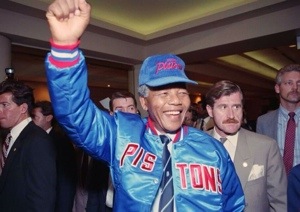 Sport is serious fun. Nelson Mandela, a keen amateur boxer in his youth, appreciated how the antiapartheid sport boycott assisted South Africa’s liberation struggle and, as a democratically elected president, he used the “politics of pleasure” to propel Rainbow Nationalism. Team sports like football reveal much about the experiences and mindsets of neighborhoods, cities, and nations. “The way we play the game, organize it and reward it reflects the kind of community we are,” is how Arthur Hopcraft put it in The Football Man (1968), one of the finest football books ever written.
Sport is serious fun. Nelson Mandela, a keen amateur boxer in his youth, appreciated how the antiapartheid sport boycott assisted South Africa’s liberation struggle and, as a democratically elected president, he used the “politics of pleasure” to propel Rainbow Nationalism. Team sports like football reveal much about the experiences and mindsets of neighborhoods, cities, and nations. “The way we play the game, organize it and reward it reflects the kind of community we are,” is how Arthur Hopcraft put it in The Football Man (1968), one of the finest football books ever written.
These issues strike at the heart of a new project I am embarking on with my Latin Americanist colleague Brenda Elsey, author of a splendid book on fútbol and politics in Chile. Brenda and I will be editing a special issue of Radical History Review on “Historicizing the Politics and Pleasure of Sport.” This marks the first time RHR, an academic journal known for “addressing issues of gender, race, sexuality, imperialism, and class, and stretching the boundaries of historical analysis to explore Western and non-Western histories” will turn its attention to sport. The issue is scheduled for publication in 2016.
Here’s the call for papers:
The global reach of football (soccer), basketball, cricket, and Olympic sports in the contemporary world can be traced back to European and U.S. imperial and commercial expansion. The agents of that imperialism—teachers, soldiers, traders, and colonial officials— believed sport to be an important part of their “civilizing mission.” Military interventions in Africa, Asia, and Latin America, often accompanied by “soft power” cultural programs and private business ventures, fueled the popularity of Western sports. Reform movements tied eugenics and racism to their dissemination. But local elites and subalterns were not simply duped; they enjoyed the games on their own terms. As more communities participated, sport came to represent and constitute broader processes of social change. In the stands, sports pages, and clubhouses, fans rendered sport a place to debate racial and gender hierarchies. In the late twentieth century, international sport became part of a new global capitalist network of sport institutions (e.g. FIFA, International Olympic Committee, International Cricket Council), private corporations, mass media, and migrant athletes and coaches. In this process, sport came to symbolize and intensify unequal social and economic relations.
Histories of sport reveal a paradox: sport generates empowerment and disempowerment; inclusion and exclusion; unity and division. Sports have provided spaces for pleasure, freedom, solidarity, and resistance, but they have also reproduced class privilege, patriarchy, and racism. The performance of masculinities, creation of ideal body types, and the ongoing marginalization of women in sport illustrate these tensions. Recent events in Brazil, where controversy over contemporary mega sporting events merged with massive demonstrations for a range of social justice issues, highlight the unusual capacity of sport both to crystallize inequalities and to trigger civic activism. Reports of labor abuses in Qatar and censorship and environmental damage in Russia cast a dark shadow on the human and material costs of hosting “mega” sports events.
The editors invite submissions from scholars working on any period and world region. We are especially interested in studies that build upon the rich historiography about the nature of agency, identity, and embodiment as a way to explore sport’s contradictory past and present.